Read more related stories

Judd Figuerres, advertising director
Ipe Cervantes, sales manager
Judd and Ipe’s loft is warmth exemplified, with enough tchotchkes to give it its own personality: a bunch of Doraemon figurines, plants they’ve raised together, and a sprinkle of homoerotic art here and there. “Is this Nolisoli?” one staffer asks of a print of two men in coitus. “We can make it if we want to,” said another. But a kitschy framed and backlit Divisoria wallpaper of three white puppies is, for sure.
On the terrazzo kitchen counter is an orange Le Creuset Dutch oven like the one owned by the late Joan Didion, which fetched $8,000/set at an auction. Later it will be filled with dal that Ipe cooked for their group dinner, accompanied by warm billowy naan tucked inside an Owa Sylvia wicker basket with a gingham liner.
As the hours tick away and the sun retreats to the west, the space is bathed in warm light emitted by a Louis Poulsen pendant, like candlelight inviting you to take a seat on their long dinner table as Pilita Corrales (on vinyl) serenades you.
READ: Home for the holidays and every moment in between
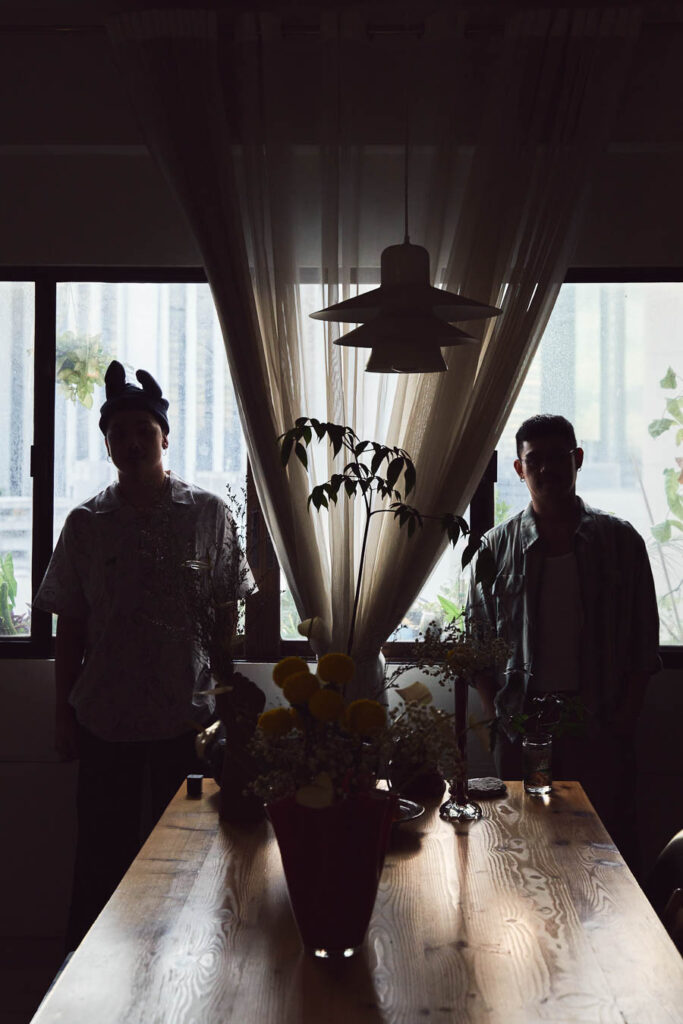
How important was it for you to have your own space in relation to your lifestyle and your work?
Ipe: This is actually the first time I moved out of my family house and be independent. So I appreciate the fact that we get to design everything to our own taste. That was fun. Like building the house from empty space to very much filled in right now with our own style.
Judd: Originally, ‘yung job kasi namin is here in Makati. Before we moved here, we were based in Quezon City, so we were always traveling from QC to Makati and back every day. And when we moved here, all we wanted was our own space kasi ‘yung work namin is so stressful. Aside from picking a spot convenient to our location for work, we really wanted to build a space where hindi lang siya extension of our personality but also something na we can do things creatively na hindi siya part of our “jobs.”
We really wanted to build a home na pag-uwi namin, we can just relax, and we can just be ourselves.
What’s the best thing about living in Poblacion?
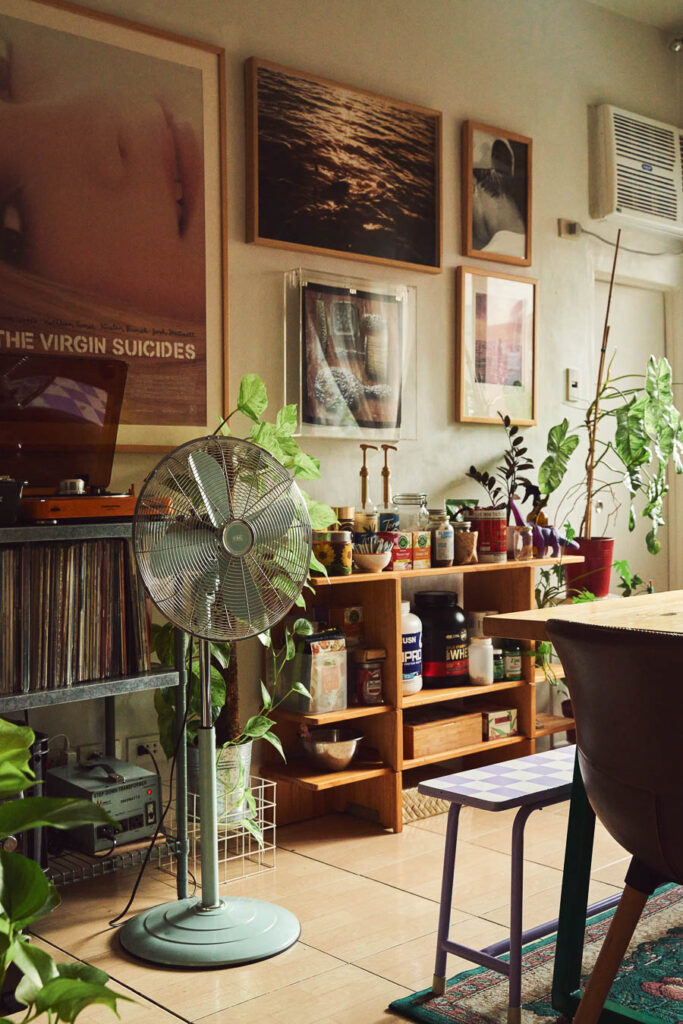
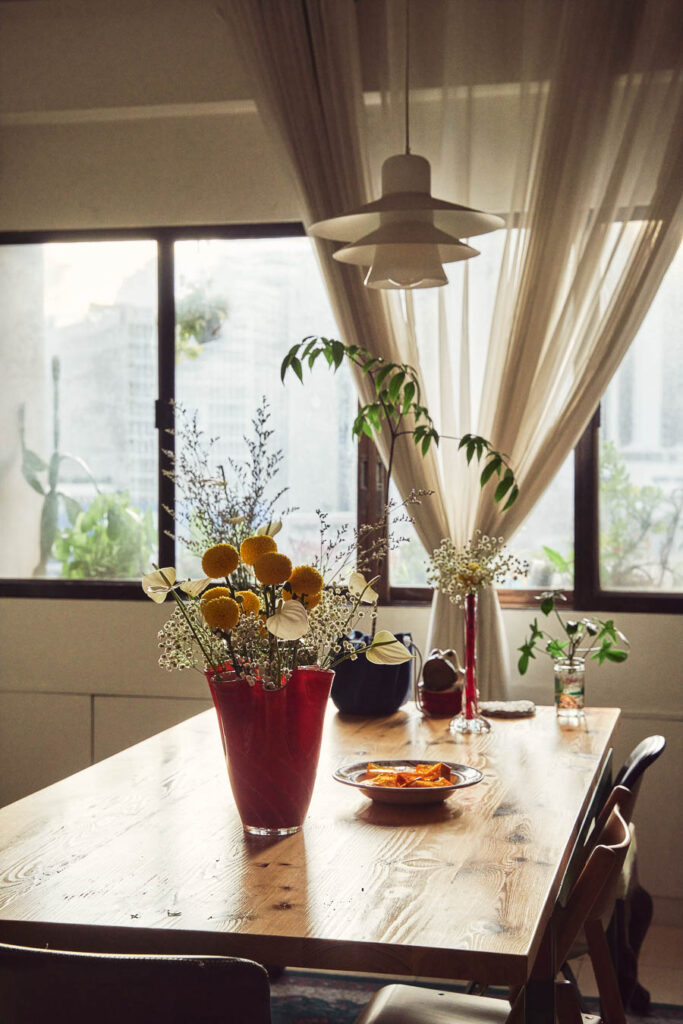
Judd: Noong una, we were like, “Oh, shit, Poblacion is going to be noisy.” So when we were testing the space, we said, “Let’s just see how the noise pollution is.” So we spent a weekend here just testing kung maiingayan kami and it was maingay.
And then, biglang nag lockdown. So it was, “Oh okay! Ang quiet ng Poblacion!” So we started yearning for that noise, ‘di ba? So when things started coming back, doon namin na feel na “Oh wow. Poblacion is so fun.”
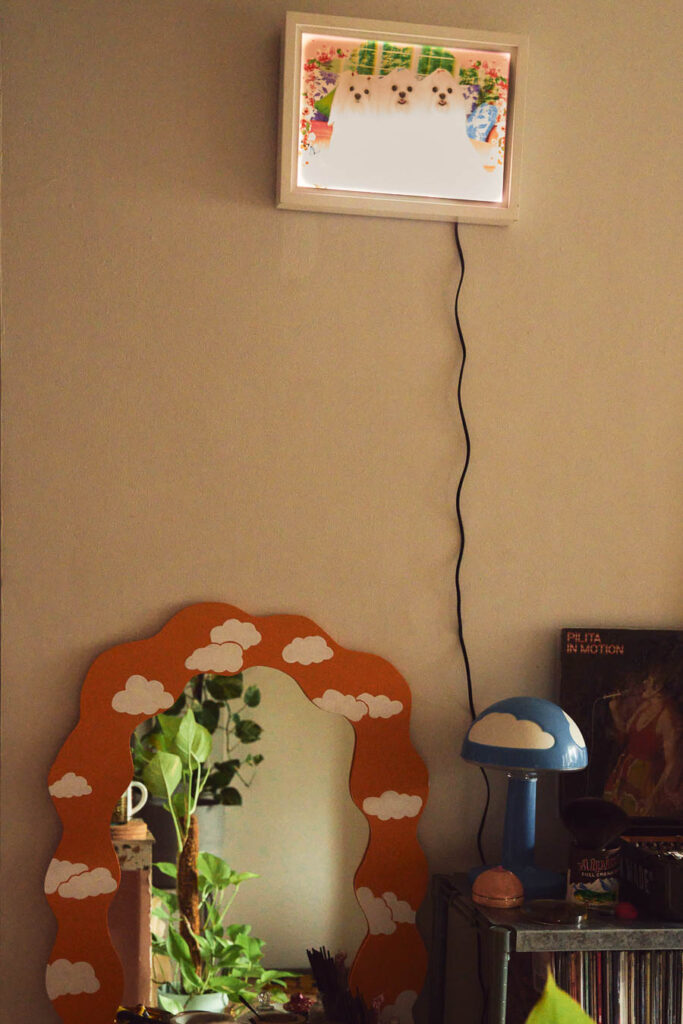
Aside from that, we’re neighbors with our friends, it was so easy for us to find people to hang out with. It’s so easy for us also to find places to hang out dito. And I think—I don’t know what you call it—revenge partying? Parang ganun? So there’s so much energy! And I don’t know, like, sometimes prior to this kasi since we were living in QC, wala kaming social life masyado. So now, medyo parang feel na feel namin ‘yung energy ng Poblacion. And we really love it here.
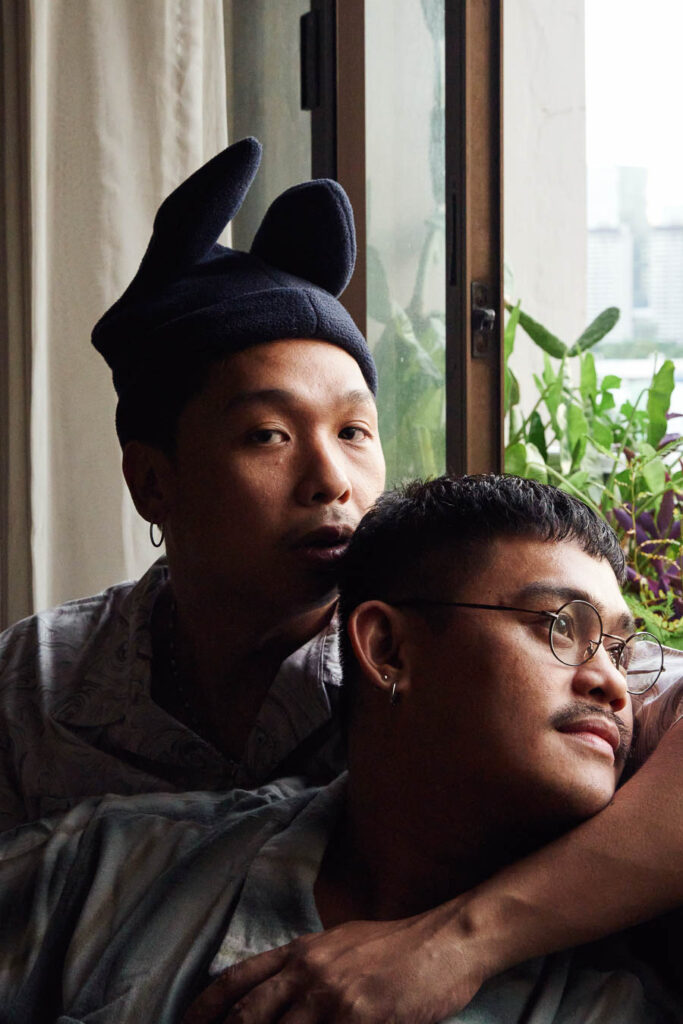
We really wanted to build a home na pag-uwi namin, we can just relax, and we can just be ourselves.
Judd and Ipe
Ipe: And the access to different restaurants. The food choices here are amazing, unlike in QC where everything is too far. Then Rockwell is just over there. And then there’s also a palengke.
Judd: There’s a palengke! Then all the clubs that play different music. You get a lot. Kasi in the morning, it’s different; sa afternoon, it’s different; at night, it’s different. So parang nagta-transform ang space every day, every hour. Kaya siya masaya.
What was the vibe you were going for when putting together this space?
Judd: When we were doing it, parang, we wanted something clean and cute—
Ipe: Initially.
Judd: Initially!
Ipe: It was very empty, initially, but then during the pandemic—
Judd: We started collecting so many things. Which is I think kind of reactionary? Because wala namang nangyayari so parang, so might as well stimulate yourself with things.
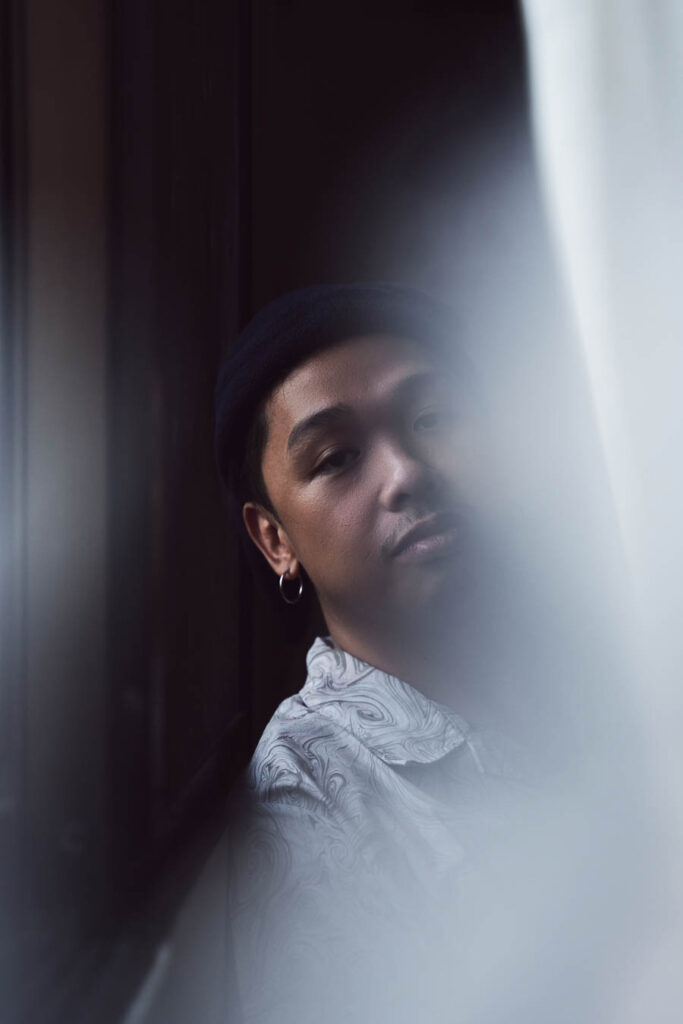
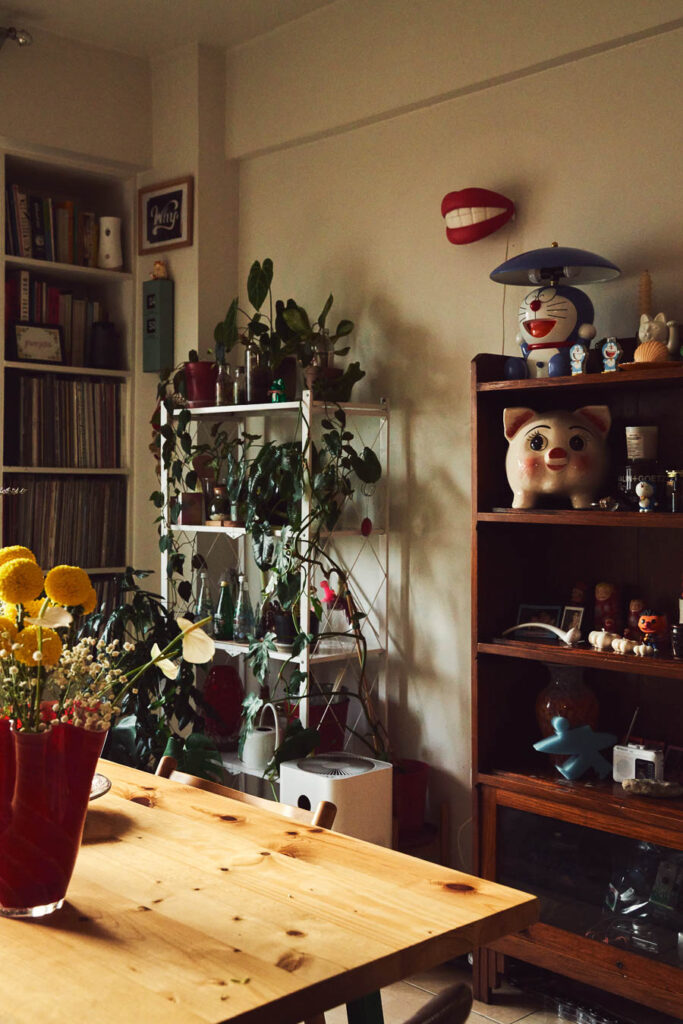
Ipe: Yeah, like Judd started collecting plants during the pandemic.
Judd: I started collecting vinyl.
Ipe: I started collecting vintage stuff like the vases and all the cute stuff around.
Judd: So I think it’s just really whatever makes us happy.
What are your favorite parts of this space?
Judd: I love this dining room because during the day this is where we work also. Kasi dito ‘yung pinakalakas na internet. Because it’s an old building the walls are quite thick. So medyo mahina ang internet sa loob ng mga kuwarto so we always work here. This area also has the best natural light. And then at night, ‘pag magkakasama kaming lahat, kasya kaming lahat dito. So this is where we host dinners.
Ipe: We love hosting dinners.
Judd: So I think, for me, this. Ikaw?
Ipe: Same. Like a lot of things happened on this dining table. [laughs]
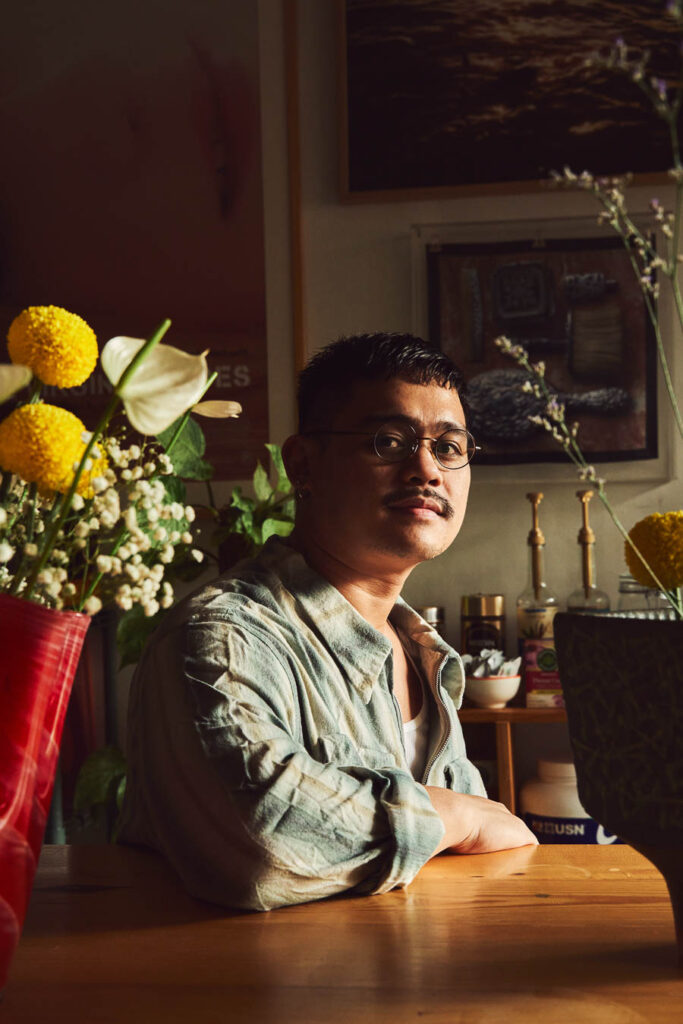
I think for me it’s the person you live with more than the space.
Judd Figuerres
What makes a perfect home?
Judd: I think for me it’s the person you live with more than the space. I feel like it’s because it’s the first time we moved in together. It’s our first attempt and it was a lot of learning din from our end because, syempre, you’re going to clash at some point. But I think ‘yung lesson is through those clashes, we learn how to harmonize more. And I think for me that’s what home is. Where you can find harmony.
Ipe: Yeah. Judd is home, our friends are home.
Bea Te, DJ
Bea’s house reminds you of that one friend in college equipped with the things you wish your dorm had: a Rihanna coffee table book, an irregular blob of a mirror, and a Bottega green reproduction of that IG-famous modular bubble couch originally designed by Mario Bellini.
There’s an air of coolness amplified by the nonchalance of having just a few covetable objects in your living quarters. Think Steve Jobs photographed sitting on the floor of his California home in 1982 with nothing but an $8,200 stereo setup and an antique Tiffany lamp.
Mano Gonzales jokes, Bea just packs and unpacks here. She’s everywhere. That weekend she’ll be in Cebu. Nonetheless, she vouches for the importance of having a space in Makati, which we might have overread as having a space in the scene.
READ: Home for the holidays and every moment in between
How important was it for you to have your own space in relation to your lifestyle and your work?
I’ve always lived alone since I was like 16 when I moved to Manila, so I’m used to that. I’m from Bacolod. But the pandemic really changed that ‘cause as much as I like living alone, I am a very social person. I used to live in Poblacion as well. When I moved here, it really was like a breather. I felt saner just because I had my own space, but I also had all these amazing people around me. And it was like our little safe space during the craziness of the pandemic.
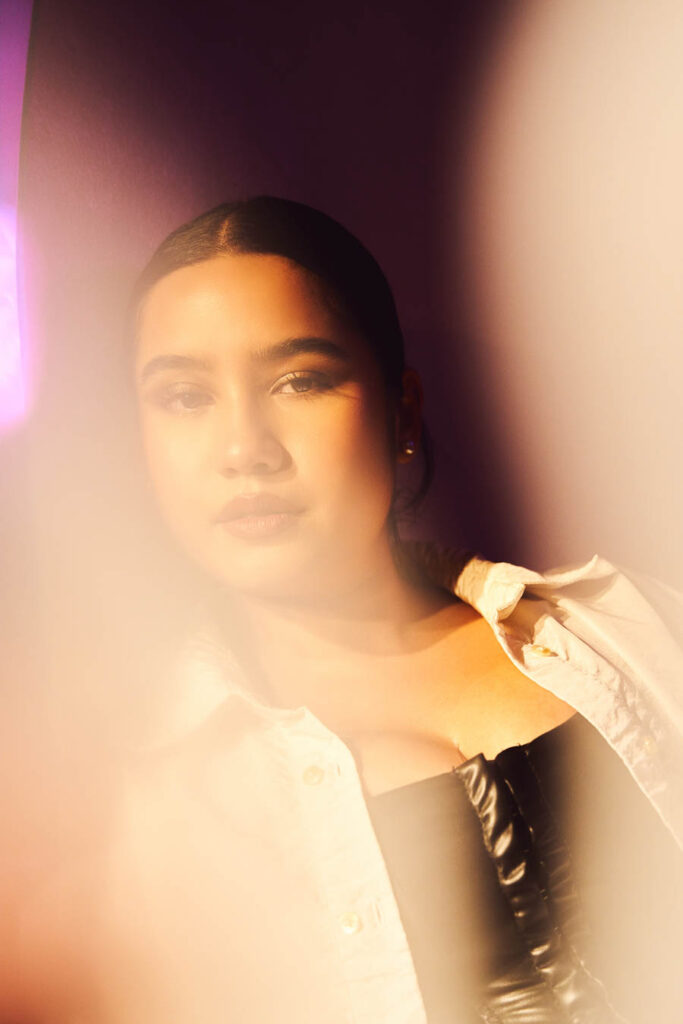
What’s the best thing about living in Poblacion?
Number one for me is most of my work is here. I usually play in bars around Poblacion, so I just walk everywhere. That’s mainly the reason why I moved here. But also in general, I feel like I’m never alone because there are just so many people here.
And the food scene, you go down and you have everything from bars to restaurants to activities—everything you really need.
I never really leave Poblacion unless I really have to ‘cause everyone just ends up going here anyway. And as much as it feels a little grimy here and there, it still feels safe. It feels like home to me.
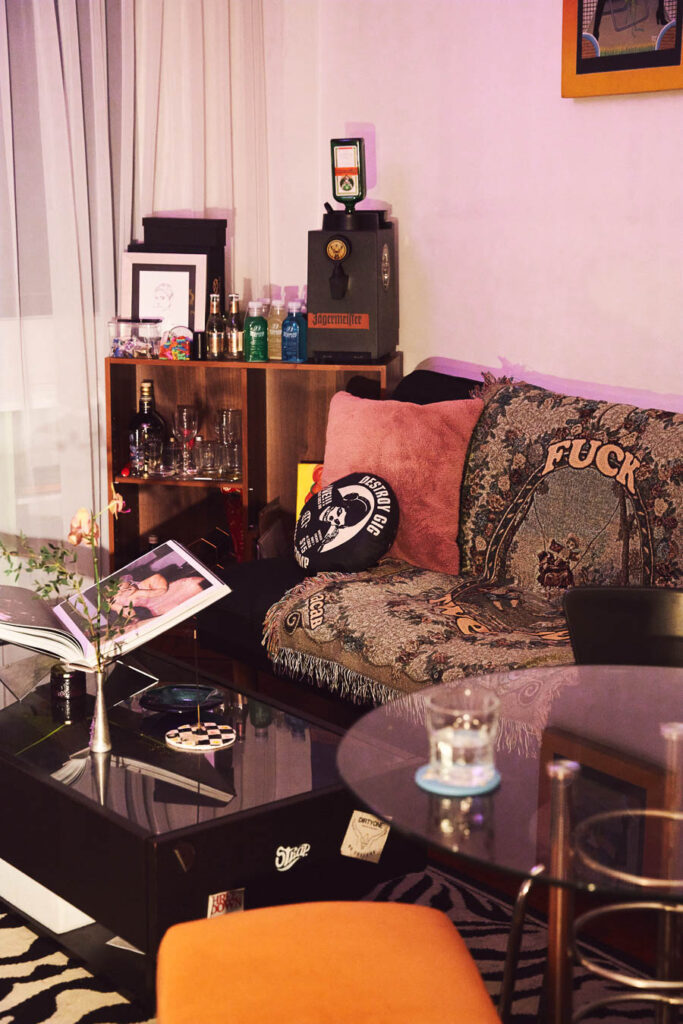
I don’t like coming into a home when it’s fully furnished. I like fixing things here and there and it grows in time with you.
Bea Te
What makes the perfect home?
I think when I moved to my space I like it when a home grows with you. I don’t like coming into a home when it’s fully furnished. I like fixing things here and there and it grows in time with you. I feel like a home is never really finished. You always want to improve it, add things, minimize things. I think the perfect home is more of a space where you can relax. Especially in a city like Manila with so many things happening and with my job, going out to events and all that. I just like coming home to a space where I can just relax and just unwind. And welcome friends also.
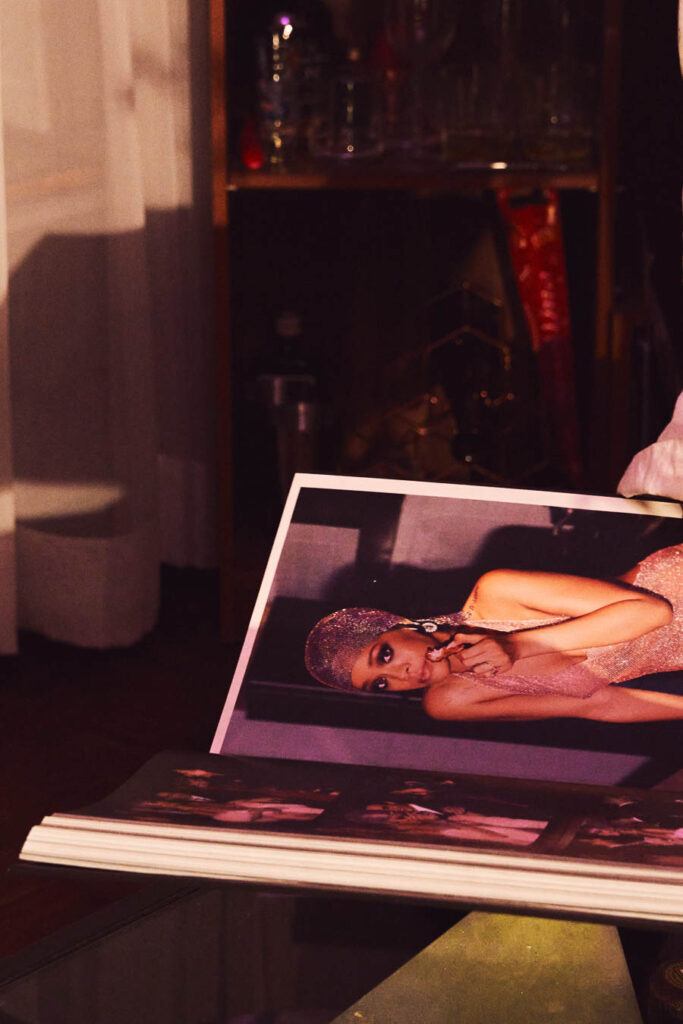
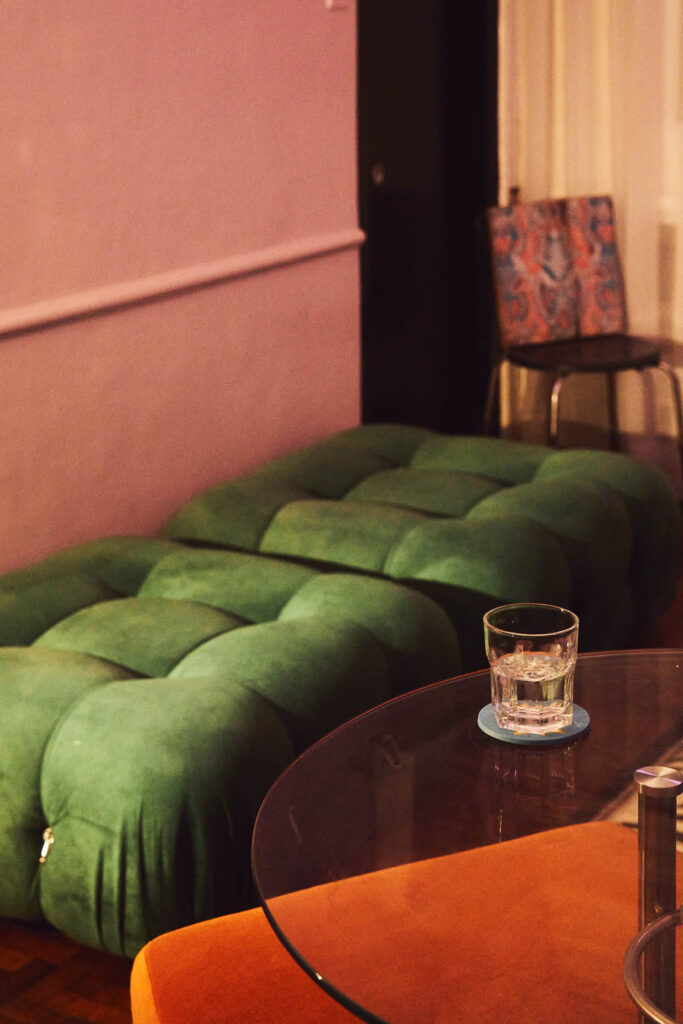
What are your favorite parts of your space?
My favorite part is definitely my living room because of our view. I don’t have a television in my living room cause it really feels like the window and the view is just the focal point of the whole space, especially during sunsets. It’s the best.
And, of course, my bedroom, because it’s what I really look forward to after going out.
Mano Gonzales, artist and stylist
Jan Pineda, film studio creative manager
Mano and Jan’s apartment was previously painted a drab brown. “We used to joke it looked like a mocha cake,” the artist says pointing to the apartment’s unique geometric crown molding. The pair has since painted it white, making vivid colors pop up against the parquet floors in one area and white marble in another: an Yves Klein blue couch in the living room and a cinema red carpet red rug in the bedroom.
The penthouse was a far cry from their previous tiny one-bedroom apartment in BGC, a rarity in the Metro Manila real estate market. So when the opportunity came, they jumped on it—despite having to hop and skip one more floor from the last elevator-serviced level. “We had to carry everything ourselves one extra floor,” Mano says. “Get movers, guys,” Jan adds.
READ: Home for the holidays and every moment in between
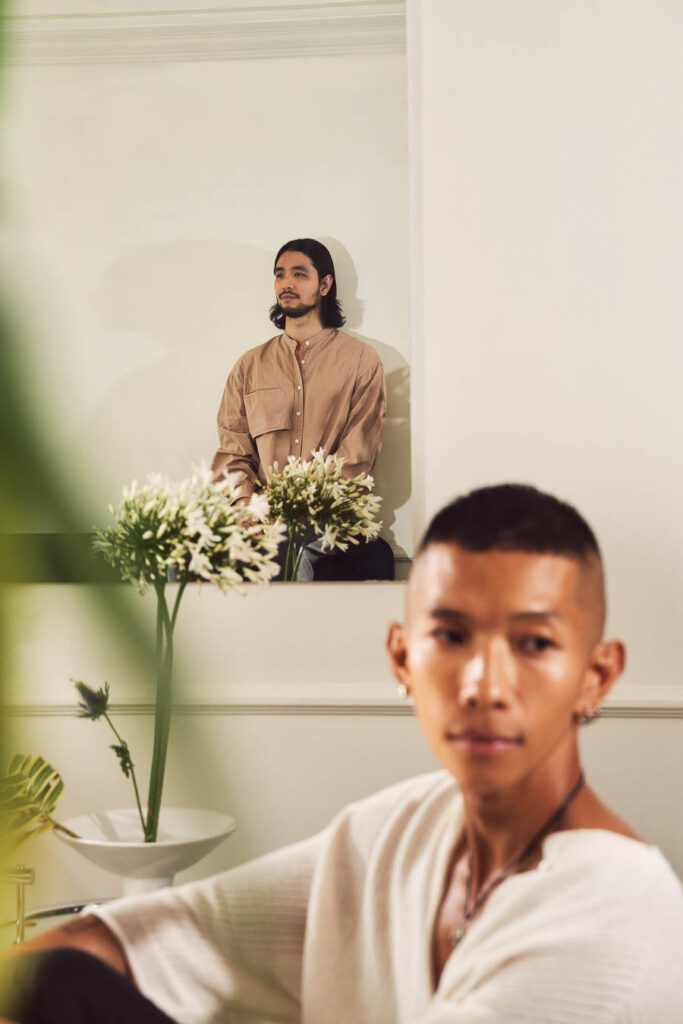
How important was it for you to have your own space in relation to your lifestyle and your work?
Jan: Well, I guess for me, we moved to work from home. So it’s important to have that space where I can do my work but also share it with friends.
Mano: Basically to also have a bigger space to do our work and to thrive personally so we can create a space that’s comfortable, that’s also inspiring, and have enough space to do personal projects in. And like Jan said, to have friends over. Because we have a lot of friends who live in the building, there’s a sense of community. We moved here during the lockdown, so that was a time when we can’t go out, can’t see people, because this is basically like a bubble for us. Para hindi namin masyado mafeel ‘yung lockdown vibes kasi we always hang out together.
What’s the best thing about living in Poblacion?
Jan: First, people didn’t really want to go to BGC to visit us. Here parang it’s mas central, it’s easier to go to.
Mano: Yeah, things are happening everywhere, it’s so easy to meet people and see our friends. During the lockdown, Poblacion was so quiet, walang ganap, because all the places were closed. But parang ‘di rin naman namin siya masyado na-feel because all of our friends are here (in the building) anyway.
Jan: In Poblacion, we hardly go out. All our friends are here na. But, of course, when our friends play, like si Judd [Figuerres] or si Butta B (Bea Te) plays around Poblacion, it’s easier to go.
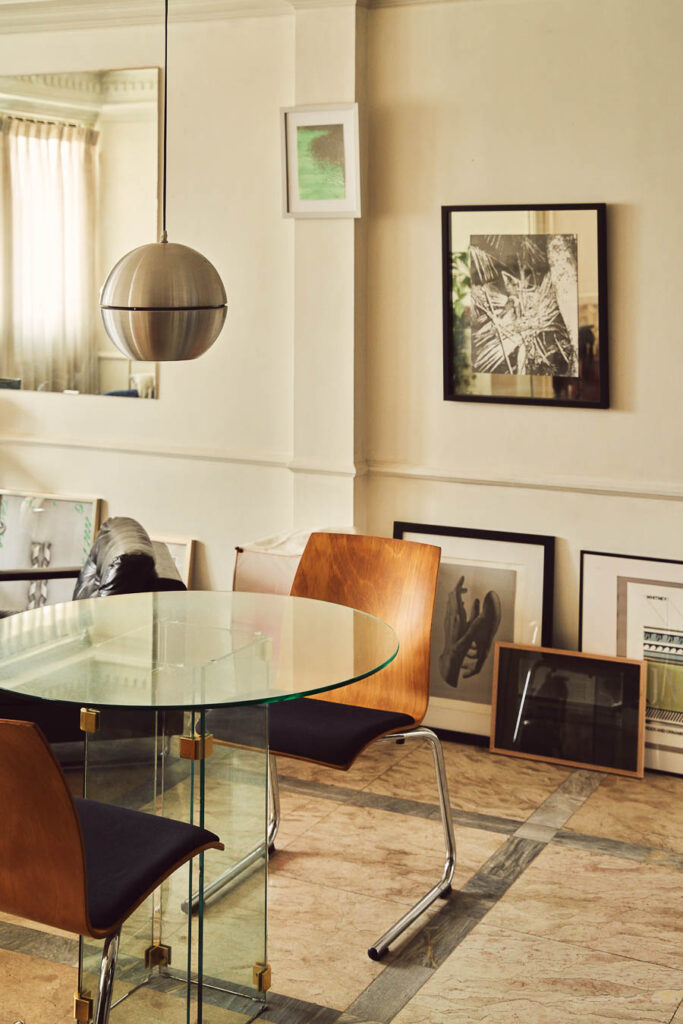
With dinner parties or having people over, you learn more about them, mas personal.
Jan Pineda
What was the vibe you were going for when putting together this space?
Jan: We built around the space lang.
Mano: We’re both very visual people, so we get inspired by the things we surround ourselves with. So I think that’s number one. Number two… is there a number two? [laughs]
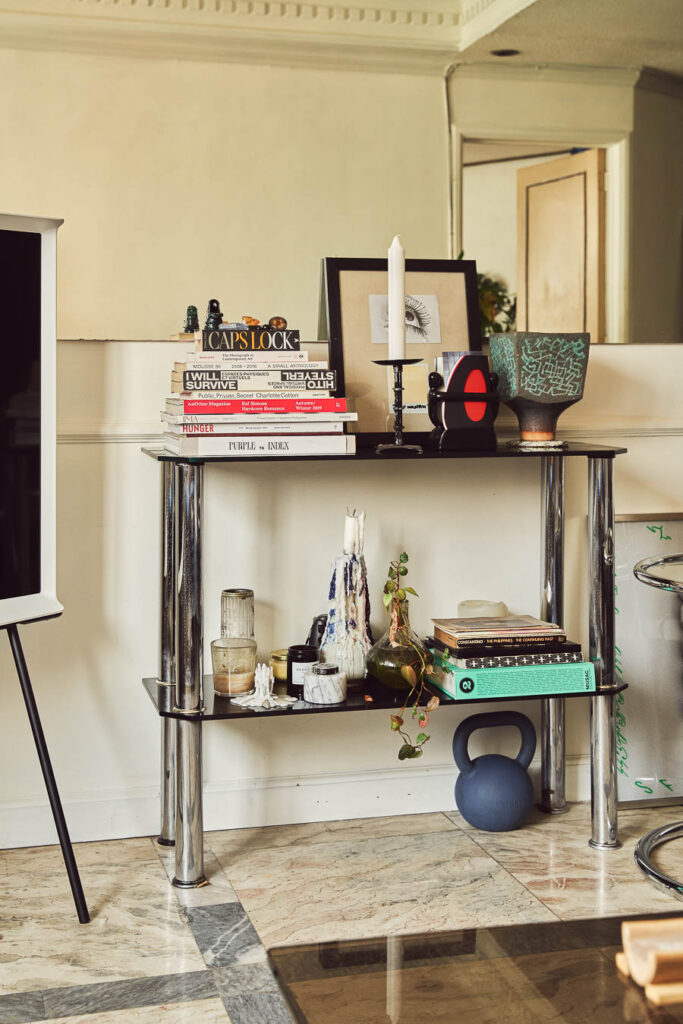
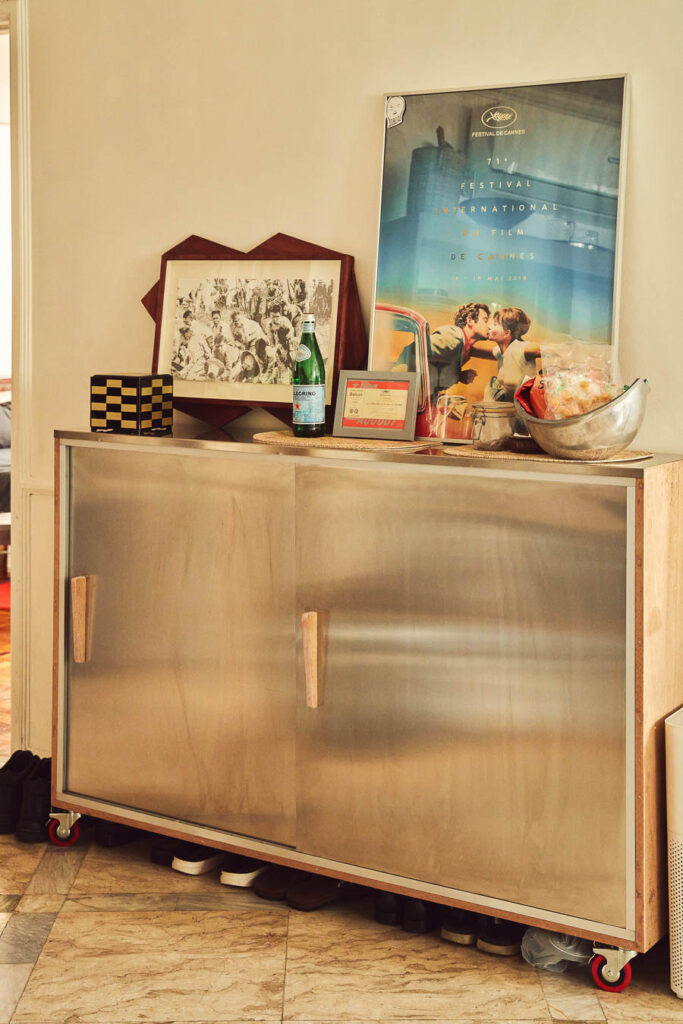
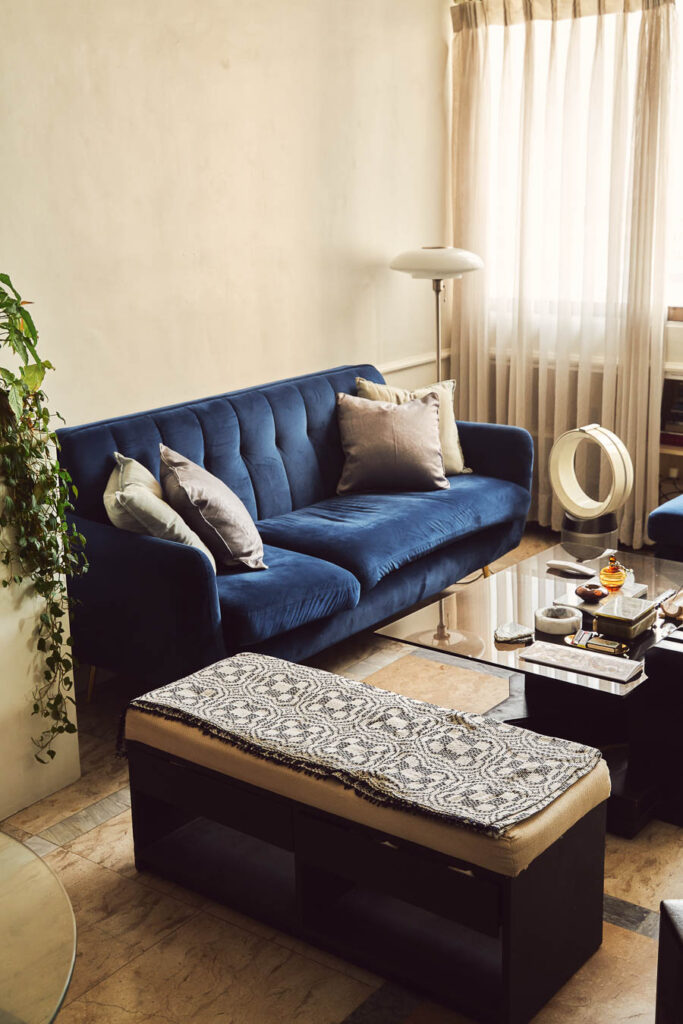
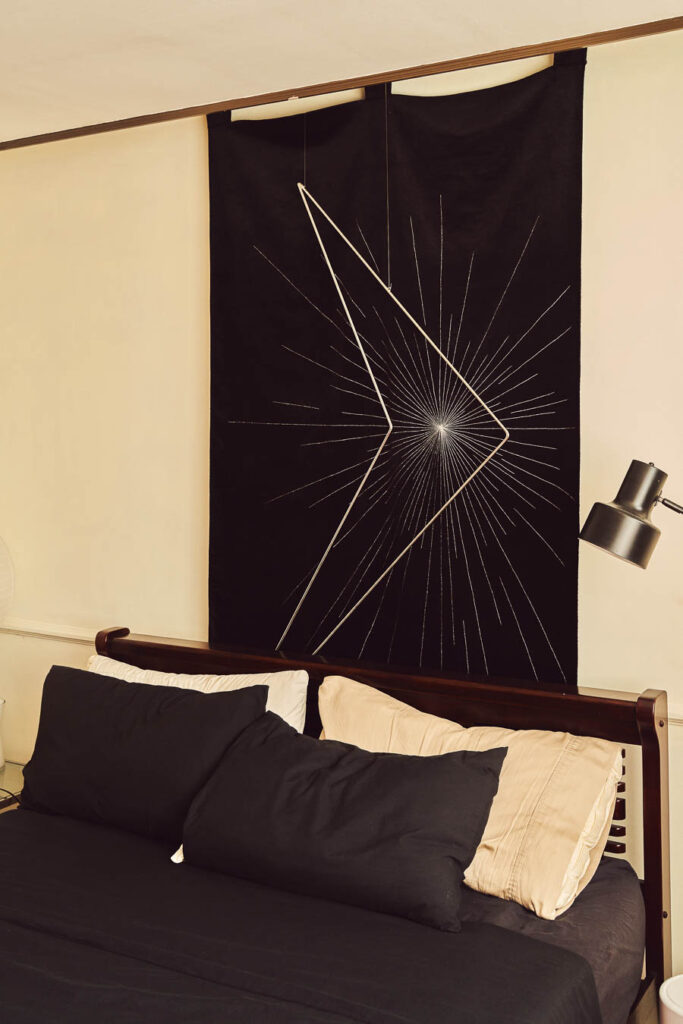
I guess things that make things comfortable and homey. Right now malakas ‘yung araw but at night it gets really cozy here, and I think ‘yun ‘yung pinaka-[non-negotiable] namin ni Jan, that it’s cozy. There’s no design brief. Though we like collecting a lot of like, most of our stuff here are old stuff from our own houses, second-hand pieces we find online–
Jan: –or stuff from travels
Mano: So mga ganun. Basically, just things that inspire us.
What are your favorite parts of your home?
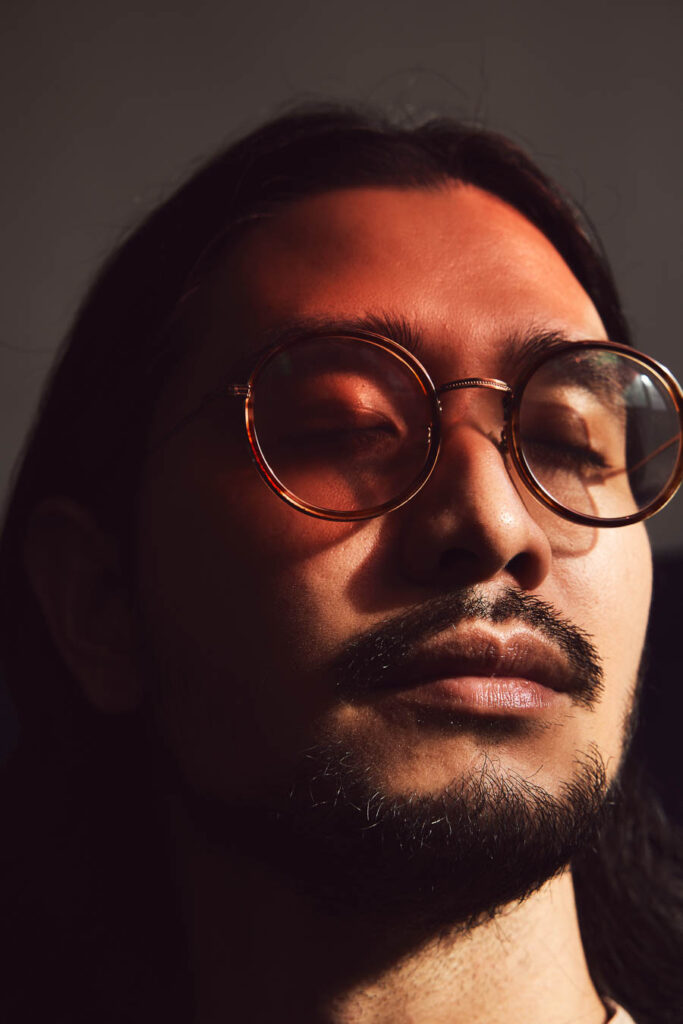
Jan: This studio work area that we also turn into a dining space when we have people over. And my favorite activity here now is hosting, having dinner parties with friends. Nung pandemic, other establishments are closed so we had to make do with the space. I think I discovered I liked that better—hosting—kasi mas intimate. Before, parang I’d hang out with friends sa bars or clubs, pero alam mo ‘yon, ang daming nangyayari. With dinner parties or having people over, you learn more about them, mas personal. Also, we work here din.
Mano: It’s the most active place. It changes a lot.
Jan: Yeah. Working on different projects, I also bring my team here sometimes. So ‘yun, here ‘yung pinakamaraming interactions.
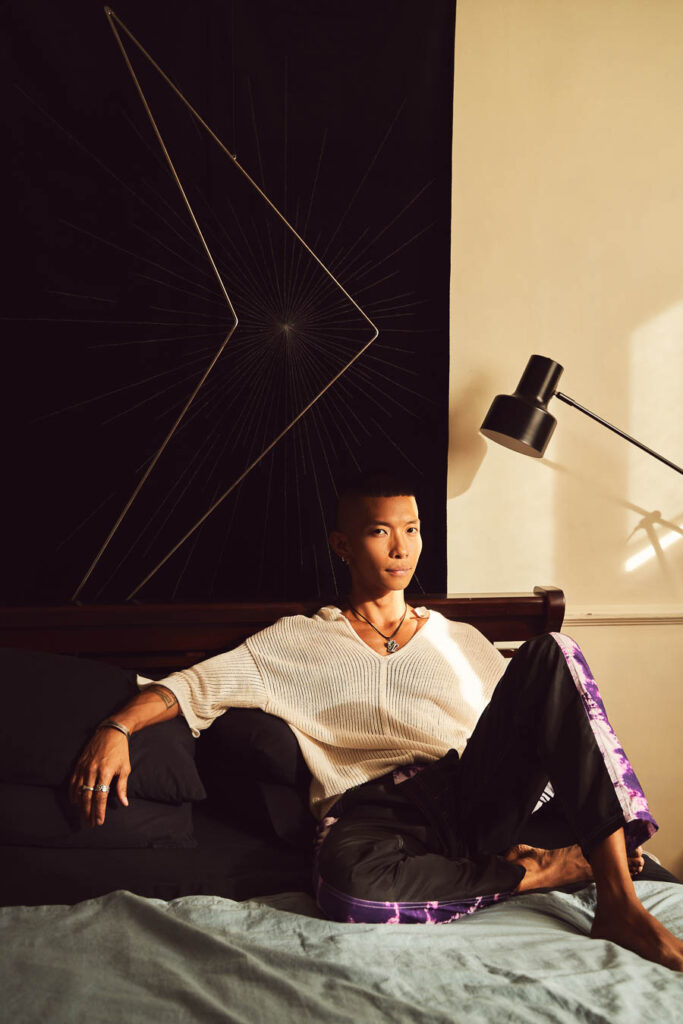
Mano: Ako naman, before we even moved here we would visit the building because we had friends who lived in this building na before. ‘Yung pinaka-crush ko talaga ‘yung view nung mga units here. Basically, you have an unobstructed view of—What is this district? CBD. This view also kind of informs how we design the space, or how we set up things.
A lot of the pieces we get here are kind of like inspired by what you see outside. ‘Yun talaga yung favorite ko about here. The view. It’s so hard to look for a view like this in Makati. And because our surroundings—Poblacion—are so active, parang naging project namin ni Jan ‘yung to make a cozy space for us. I think that’s why we never really go out anymore, we just hang out here.
Making new friends as an adult can be difficult—especially these days. A good number of the workforce is still working from home, most bars are still closed, and other avenues of meeting new people have been limited by the situation.
Personally, though, I have way more friends now than at the start of the pandemic. “How?” you might ask? The internet.
While stranger danger on the internet is still a real and terrifying thing, there are other avenues to connect with people via undersea cables. The pan de coco (again, no “P” word here) had people seeking out platonic connections online, and some have even found those connections transitioning to the real world.
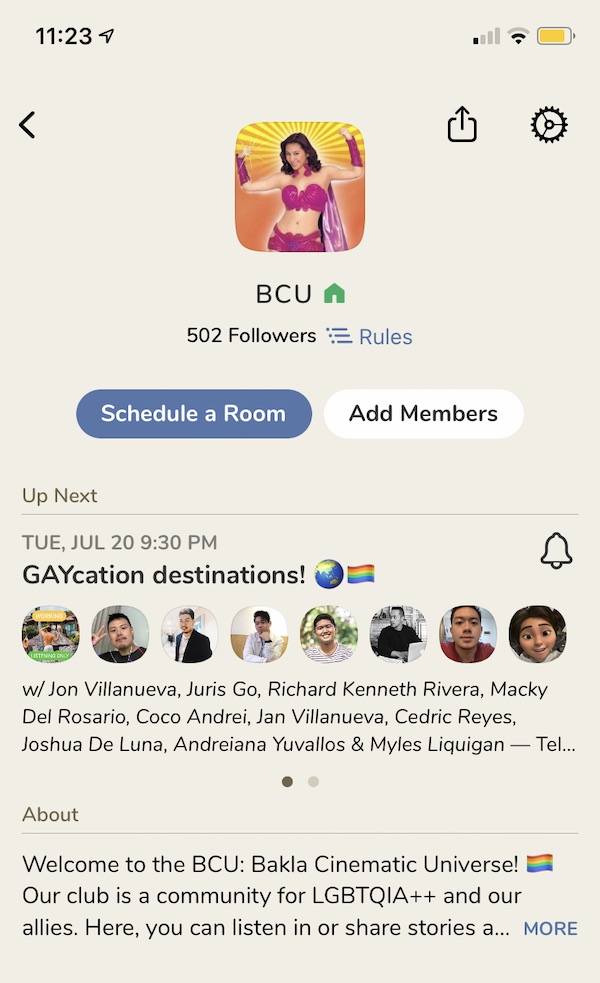
Online communities like Clubhouse, an invite-only drop-in audio chat platform; Kumu, a live streaming app, and hobbyist Facebook groups have been a godsend for the isolated—myself included.
“Mic, test.”
I’ve been on Clubhouse every day for five months now, and I don’t see myself stopping anytime soon. Initially, I joined because Clubhouse seemed like a platform that could teach me about getting better at what I did: writing. In my early days, I’d join discussion rooms about being a woman in a creative industry or audio writing workshops for creative non-fiction.
It was fun, but I also wanted to not work in my free time.
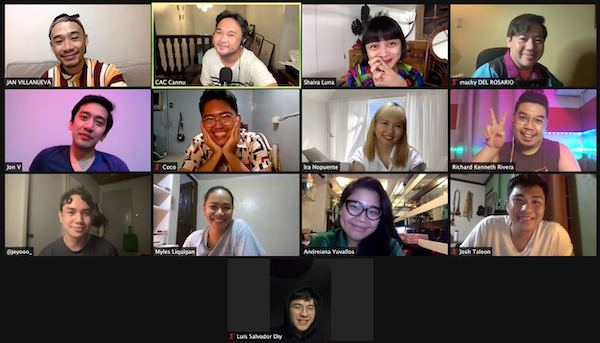
I bounced around a few clubs that held regularly scheduled rooms until I found my “home” on Clubhouse. The Bakla Cinematic Universe (BCU) is a community of queer folks and allies that talk about anything and everything under the sun. We talk about serious issues like LGBTQIA+ rights and more lighthearted ones, too, like our first celebrity crushes.
It got to a point where I felt so comfortable with everyone in the club that I actually ended up literally bawling to a few other members one morning when my trauma got inadvertently triggered.
We’ve laughed, cried, and joked about our traumas together—which is honestly the perfect recipe for a lasting friendship.
Meeting your “idols” can be a good thing
Downloading new social media apps can seem daunting, which is exactly what Nolisoli managing editor Pau Miranda’s first impression of Kumu was. After discovering the app through a few members of the theater community she followed, she literally said, “No, not another social media platform!”
Her initial reservations were quickly put to rest after trying it out and seeing how interactive the app was. “I really signed up for Kumu so I can watch my favorite theater artists, so I love that I get to watch them perform, but at the same time I also get to talk to them in real-time,” Pau said.
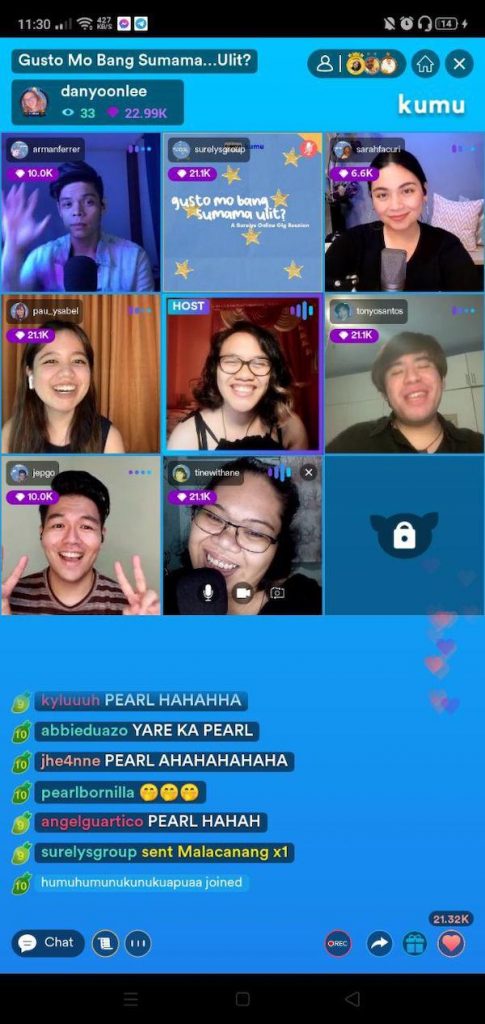
Since theaters were closed at the time (and still are), it was the closest she could get to watching her favorite performers doing what they loved—performing in front of an audience.
Due to Kumu’s interactive nature, Pau ended up becoming friends with the performers she admired on stage. “Eventually [I] even got to be friends with them because of [Kumu]. I also discovered people with the same interests through the streams, and [we] became friends too,” she added.
While the performance aspect of things is how Pau started on Kumu, she stayed because of the more casual streams where they’d co-work, cook, or just plain hang out. That’s also how they all got closer.
“We sent each other gifts last Christmas, we’ve spent hours having existential, life, and mental health conversations. They even sent an advanced birthday gift last week. Like, do non-real friends even do that?
While Pau and the friends she’s made on Kumu haven’t met up yet, they’re already a big part of each other’s lives. And they’re already planning on how to set things up when it’s safer, post-quarantine.
“We’ve actually talked about [meeting up] a lot. Like the logistics of how we’re all going to meet up once we can. I’d like to think that the friendships have really grown beyond just the streams. Aside from chatting all the time and adding each other up on other social media platforms, we really do things like celebrate life milestones too,” Pau continued.
“We sent each other gifts last Christmas, we’ve spent hours having existential, life, and mental health conversations. They even sent an advanced birthday gift last week. Like, do non-real friends even do that?” she concluded.
There’s a group for that
No matter how niche your interests are, it’s guaranteed that there’s a group for that. The internet is an immeasurably huge space with nooks and crannies filled with people who are passionate about something and willing to share their passion with others.
My friend, Kat Olan, found her online tribe through Komiket—a community devoted to affordable art and komiks. She initially joined Komiket’s Philippine International Comics Festival for a chance to turn her Filipino sci-fi novel “Tablay” into a graphic novel.
After being selected as one of the winners, she and her fellow winners now have a group dedicated to their craft, all while geeking out about it. While she was a little intimidated by joining the ranks of “war-hardened komik veterans,” she found that they’re all just “a bunch of geeky creators who love memes, art, and stories.”
Her favorite thing about the group is how nobody is in want of support. “We are each other’s greatest fans, supporters, and competition. We are all supportive and excited for each other. Whenever someone shares a new inked spread we all go wild! People are so talented and words can’t even express it,” said Kat.
A few final reminders
The friendships I’ve found over quarantine are friendships that I’ll treasure forever. These connections have gone offline and into the real world, but only after a lot of verification and trust. The internet is still the internet, and you need to do your due diligence.
Also, don’t stress out about impressing other people. We’re all way past the point of acting cool on the internet to make friends. Just be yourself. Authenticity is the new cool, and people will gravitate towards you if you’re true to yourself.
Have fun, be safe, and God bless the internet.
Forming low-maintenance friendships is the self-care secret I never knew I had. To put it bluntly, I’m a high-maintenance person. Much like orchids, I require a lot of care and attention to keep blooming. But in the friendship department—surprisingly—not so much.
Like most extroverts, I felt myself physically wilt during the panorama (again, I refuse to type out the “p” word). Instead of my regular routine of being out and about, forced confinement left me feeling all sorts of ways—and none of them positive. For a period of time, I shut down. I didn’t know how to transition all my physical world friendships to the online world, and I didn’t bother finding out.
Low-maintenance lifesaving
It wasn’t until one of my best friends from college reached out to me that I realized how out of touch with the rest of the known world I’d become. Our joke was always “For two high-maintenance girls, we have the lowest-maintenance friendship known to man.” I didn’t know it at the time, but I was actually spiraling downwards. Her little check-up brought me back.

While yes, friendships do require a lot of work, there are just some friendships that are the “set it and forget it until it’s ready” type. For myself and this specific friend who unknowingly pulled me out of my spiral, we used to see each other every day. We were blockmates in college and groupmates in almost everything.
And then, like with most things, life gets in the way.
We graduated, started working in different fields, but pre-pan de coco, always saw each other for a catch-up session when work allowed. Fundamentally speaking, our friendship had changed. Instead of constant physical companionship, we ended up being there for each other in spirit. As time passed and changed us, it changed our friendship, too. And in my opinion, for the better.
Aging like fine wine (or cheese, if that’s what you’re into)
A big part of growing up is realizing that your relationships with others will change. An even bigger part of growing up is accepting that. This virus-driven house arrest has taught us many lessons, and chief among them is holding on to what matters to us. What I personally realized is the importance of how we hold on to those things.
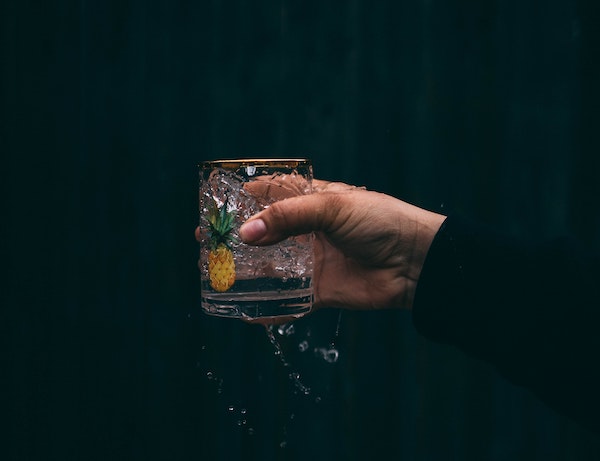
When we realize that something we care deeply about is about to go flying out the window, our first instinct is to clutch on to it as tightly as possible. But there should be some variation on how we hold on to what’s dear. If we hold on to things too tightly, there’s a tendency it might break. Knowing how to treat other people is exactly the same. If we hold on to others with a death grip, they’ll want to cut and run. But if we find the right balance, it’ll stay, grow, and even get better.
Low-maintenance friends aren’t always there, but they’re always there when you need them.









